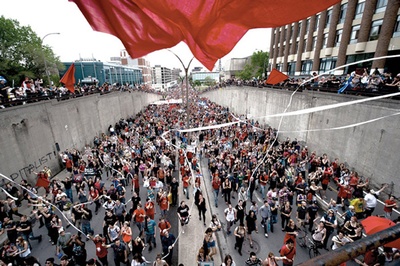Why Montrealers Must Resist Bylaw P-6

The 2012 Quebec student strike. Photograph by David Vilder.
The right to demonstrate means little to me. As the recent mass arrests under the controversial new Montreal bylaw P-6 clearly demonstrate, freedom of association and expression are handed out and taken away by those in power as they see fit. Just this week, for example, the provincial government announced its refusal to conduct a widely demanded public inquiry into police actions during the student strike of 2012, instead launching a “special commission” headed up by the same man who oversaw the unprecedented repression of popular resistance during the 2001protests against the Summit of the Americas in Quebec City. The right to demonstrate was convenient when it fit into the Parti Québécois’ long-established strategy of riding to power on the backs of social movements. Now? Not so much.
What matters, more fundamentally, is the capacity, the will, to demonstrate. It’s this that the Service de police de la Ville de Montréalis out to break, and the potential success of this effort is truly frightening. On March 22, the one-year anniversary of the beginning of monthly massive demonstrations during the student strike, I found myself among a small group of people trying to encourage the milling crowd to take the street and begin the march. As our little bunch chanted the familiar “À qui la rue” refrain, the answer was chillingly clear. Cops were everywhere: on foot, on bikes, on horses, behind riot shields, carrying massive guns. The protestors looked, frankly, scared, huddled on the sidewalk in groups of twos and threes. And with good reason: barely a week before, the SPVM’s brutally swift shut-down of the annual March 15 Demonstration Against Police Brutality sent a clear message—stay home, shut up, or else.
What’s the context for this directive? For close to one hundred years, Montreal has been the nerve centre for a transnational network of anti-capitalist and anti-imperialist movements. Malcolm X’s parents met each other here in 1917, when they were both activists involved in anti-racist Garvey-ite community organizing in present-day Little Burgundy. In the 1960s, Third World-inspired Québécois students laid the framework for a student syndicalist movement that would change the concept of education forever. In the 1970s, the federal government was forced to declare marshal law to get the best of militant sovereigntist activists, and feminist movements fought for the right to choice and self-determination. In the 1990s, Montreal saw its own version of Stonewall as queers fought back against brutal police raids. Indigenous Mohawk land defenders in the nearby communities of Kahnawake and Kanehsatake took up armed struggle against the Canadian Army—and won. Militant, combative demonstrations have filled the streets, tasted blood and always, always, fought back.
The police and the government have relied on everything from ideological spin to billy clubs to contain these uprisings, with varying degrees of success. What changed the equation recently, though, is the historic uprising of 2012. Following the passage of Bill 78, average people were politicized by the thousands. Mothers and fathers took the streets in defence of their children, Grand Prix party-goers got their first taste of tear gas and many demonstrators chanted “Allez les noirs” as masked black-blockers sought to protect them from rubber bullets and trigger-happy cops. Police stepped up the violence. Students lost body parts. Youths were arrested on the way to their siblings’ funerals. People were waking up.
And so the police and the government went looking for a formula to regain strength, and came up with by-law infractions as the solution. It’s almost too perfect. So reasonable sounding. After months of contestation, we can finally have demonstrations without a fuss. Police negotiating march routes with law-abiding activists, with nary a mention of the systemic daily violence of life under capitalism.
Again, the scary thing is that it’s working. It’s become harder and harder to take back public space in Montreal over recent months, and police spin doctors continue to pound home the message: there are good demonstrators and bad demonstrators, and the latter are legitimate targets for contempt and violence. It’s okay for them to be held for hours for the equivalent of parking ticket, to be handcuffed and pushed around, to be denied access to washroom facilities, food, and water, and to be illegally searched and identified.
Faced with this, movements for social justice have only one choice: total and complete non-collaboration. There are a variety of options: support the constitutional challenges to Article 500.1 of the Highway Safety Code (another seemingly innocuous law used to repress demonstrations) and P-6. Continue to take the streets. If you receive a ticket, contest it. Participate in collective lawsuits. And perhaps go even further. If arrested at a demonstration, refuse to identify yourself. Fill the holding cells, and then the courts. Fight back. In Montreal, this is our specialty, our history and our responsibility.





